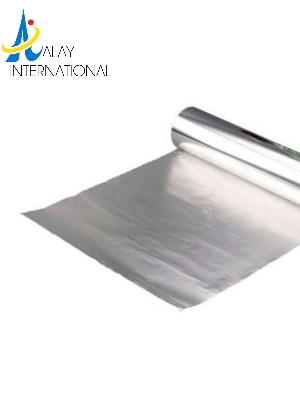About Food Wraping Foil
ALAY INTERNATIONAL Aluminum food wrapping foil is a versatile, durable, and heat-resistant material widely used for food storage, cooking, and packaging. Heres a detailed overview of its properties, uses, and benefits:
1. Material Composition
- Aluminum: The foil is made from thin sheets of aluminum metal, which is rolled out to very thin gauges, typically between 0.006 and 0.2 millimeters thick.
- Non-toxic and Food-safe: The material is safe for contact with food and does not release harmful chemicals when used correctly.
2. Properties of Aluminum Foil
- Heat Conductivity: Aluminum is an excellent heat conductor, which is why it's commonly used for cooking and baking. It helps evenly distribute heat and reduces cooking times.
- Barrier Properties: It acts as an effective barrier against moisture, light, air, and bacteria. This helps preserve the freshness of food, prevent freezer burn, and reduce spoilage.
- Reflective Surface: The shiny side of aluminum foil reflects heat, while the dull side is less reflective but provides the same barrier properties.
- Non-reactive: Aluminum foil does not react with most food products, making it ideal for packaging or wrapping various food items.
3. Common Uses
- Food Storage: Aluminum foil is commonly used to wrap leftovers, sandwiches, and snacks, keeping them fresh by preventing air exposure.
- Cooking and Baking: It is used for roasting, grilling, and baking. It can be used to cover pans, line baking sheets, or even wrap food (such as vegetables, meats, and fish) for cooking.
- Freezer Storage: Its ideal for freezing foods like meats, leftovers, and baked goods because it prevents freezer burn.
- Packaging: Aluminum foil is frequently used in food packaging, particularly for ready-to-eat meals, snacks, and candy bars, providing an airtight seal.
- Grilling: It can be used to create packets for grilling, helping to lock in moisture and flavor.
4. Advantages
- Versatile: Suitable for a wide range of food storage, cooking, and wrapping applications.
- Preserves Freshness: Helps maintain the quality of food by preventing moisture loss, oxidation, and contamination.
- Lightweight: Despite its strong protective properties, aluminum foil is light and flexible, making it easy to use and store.
- Easy to Shape: Aluminum foil can be easily molded into different shapes, such as wrapping individual servings, making containers, or creating packets for cooking.
5. Environmental Concerns and Recycling
- Recyclability: Aluminum foil is 100% recyclable, making it an environmentally friendly option if disposed of properly. However, contamination with food residue can complicate the recycling process.
- Single-Use: Due to its tendency to be used once and discarded, aluminum foil contributes to waste. However, many recycling programs accept it if cleaned.
6. Types of Aluminum Foil
- Heavy-Duty Foil: Thicker and more durable than standard foil, often used for heavy-duty cooking tasks like grilling or roasting meats.
- Standard Foil: Typically used for wrapping foods, lining baking sheets, or covering dishes in the refrigerator.
- Non-stick Foil: Coated with a non-stick surface, ideal for baking or roasting sticky or delicate foods like cookies or fish.
7. Considerations
- Heat Resistance: While aluminum foil can withstand high temperatures, it should not be exposed to direct contact with open flame, as it can burn.
- Acidic Foods: When wrapping acidic foods (like tomatoes or citrus), there can be some reaction with the aluminum, leading to a metallic taste or corrosion. This is less of an issue with foil thats not directly in contact with the food.
- Microwave Use: Aluminum foil should generally not be used in a microwave because it can cause sparks or even start a fire due to the metal's reflective properties.
8. Alternatives
- Plastic Wrap: A thinner, stretchable alternative for food storage, though it doesn't have the heat-resisting or cooking properties of aluminum foil.
- Wax Paper/Parchment Paper: Used for food storage and baking but does not provide the same moisture or heat protection as aluminum foil.
In summary, aluminum food wrapping foil is a versatile, durable, and essential tool for preserving food, cooking, and packaging, with several advantages for both home and professional use.

